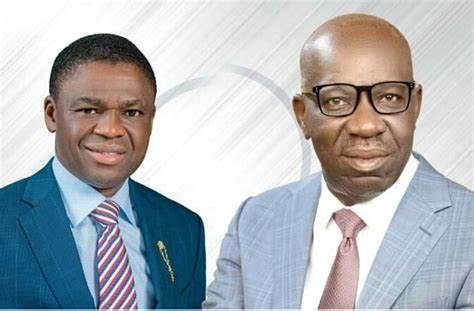
The State Assembly described Shaibu’s alleged offences were impeachable.
The Edo State House of Assembly has accused the state’s Deputy Governor, Philip Shaibu, of leaking the government’s secrets and committing perjury.
The State Assembly described Shaibu’s alleged offences were impeachable.
This comes amid a prolonged rift between Governor Godwin Obaseki and the deputy governor.
The Assembly made the allegation on Wednesday stating its case at the inaugural sitting of the seven-man panel set up by the Chief Judge of the state, Justice Daniel Okungbowa, to probe the deputy governor.
The impeachment panel which is headed by retired Justice S.A. Omonuwa was set up at the instance of the State House of Assembly, which on March 5 commenced the impeachment process against Shaibu.
Ohaifa accused Shaibu of leaking the state government’s secrets in the affidavit he filed in support of an Abuja lawsuit, adding that the deputy governor tendered documents relating to the State Executive Council’s meeting.
He said that by doing so, Shaibu violated the Oath of Secrecy he took and acted contrary to the provisions of Schedule 7 of the 1999 Constitution.
After hearing the Assembly’s case, the impeachment panel adjourned till Thursday (today), for the deputy governor to enter his defence.
Meanwhile, earlier at the proceedings, Shaibu’s lawyer, Prof. Oladoyin Awoyale (SAN), excused himself from the hearing after the panel declined his application to suspend the proceedings.
Awoyale in his submission urged the panel to suspend the impeachment proceedings pending the outcome of a suit filed by Shaibu before a Federal High Court in Abuja.
The counsel for the deputy governor told the impeachment panel that the court had fixed April 8 for parties in the suit to appear to show cause why it should not grant Shaibu’s prayer for an interlocutory injunction to halt the impeachment proceedings.
However, the deputy clerk rejected the argument of Shaibu’s lawyer, saying by virtue of Section 188 (10) of the 1999 Constitution, no court has the right to prevent the House of Assembly or the seven-man panel from performing their constitutional duties.
He said that Shaibu’s lawyer must convince the panel that the provisions of the constitution had been altered for the panel to sustain his argument.
The panel chairman, Justice Omonuwa, in his ruling, agreed with the deputy clerk, noting that the invitation for the parties to show cause was not an order to halt the impeachment proceedings.
According to Justice Omonuwa, the panel would continue with the proceedings.
Responding to Justice Omonuwa’s ruling, Awoyale said that Shaibu would not be able to continue to participate in the investigation and sought the panel’s permission to be excused.
When asked whether he was waiving his right to defend his client, Awoyale answered in the negative.
He stressed that parties must obey the court decision and that they should appear before it to show cause, and when probed further if he was “arresting the ruling of the panel”, he also answered in the negative and stressed the need to obey the court which would be sitting on Monday, April 8.

